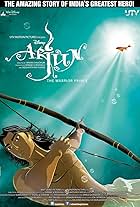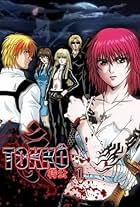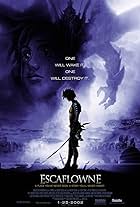Añade un argumento en tu idiomaA fatally injured girl is saved in her near death experience to become the chosen defender of Earth.A fatally injured girl is saved in her near death experience to become the chosen defender of Earth.A fatally injured girl is saved in her near death experience to become the chosen defender of Earth.
Explorar episodios
Reseñas destacadas
I must confess that I only began watching this anime because the DVD's were available at my local library. That being said, I've only watched volumes 1, 2 and 4, therefore my perceptions may be contrary to what others may have felt.
I shall begin by saying that 'Arjuna' makes the audience think. Not just about the story, but on what is *really* being said, and how this 'truth' is represented not only in the audience's macro world, but also in their micro world. For me, it made my question the nature of 'truth' in terms of what we are told, and what we choose to believe.
I shall be more specific; we are all brought up to believe that there is 'bad' in the world, and that we must either fight it, or protect ourselves from it. This is how Juna perceives the 'Raaja'. I've come to realise that as the protagonist of our *own* stories, we really are fools to assume that we don't play a part in our own misfortunes (actions or otherwise). We make bad decisions; like eating the unhealthy, processed foods, and rationalise and deceive ourselves with "but it's all due to consumerism. 'They' made it available and tasty to eat."
This anime has made me take responsibility for some of the choices I make. It hasn't stopped me from eating processed food (like hamburgers), nor has it made me choose to live as the old man did (though I did consider it for a short while). I can't say that with every action I make from now on, that I would be considering its possible effect on the future of the planet. I will be aware however, that I am just as responsible for how the world is today as anyone else.
I shall begin by saying that 'Arjuna' makes the audience think. Not just about the story, but on what is *really* being said, and how this 'truth' is represented not only in the audience's macro world, but also in their micro world. For me, it made my question the nature of 'truth' in terms of what we are told, and what we choose to believe.
I shall be more specific; we are all brought up to believe that there is 'bad' in the world, and that we must either fight it, or protect ourselves from it. This is how Juna perceives the 'Raaja'. I've come to realise that as the protagonist of our *own* stories, we really are fools to assume that we don't play a part in our own misfortunes (actions or otherwise). We make bad decisions; like eating the unhealthy, processed foods, and rationalise and deceive ourselves with "but it's all due to consumerism. 'They' made it available and tasty to eat."
This anime has made me take responsibility for some of the choices I make. It hasn't stopped me from eating processed food (like hamburgers), nor has it made me choose to live as the old man did (though I did consider it for a short while). I can't say that with every action I make from now on, that I would be considering its possible effect on the future of the planet. I will be aware however, that I am just as responsible for how the world is today as anyone else.
I have first seen this anime at the Anime Expo 2002. They showed the first episode in a panel, and I suddenly liked it. It was the music I tell you! I quickly recognized who the composer is, seeing as some of the lyrics weren't Japanese but some made-up language. And I was right! It was Yoko Kanno! She's done brilliant music before, such as Escaflowne, Macross, Lodoss War, and Please Save My Earth. Also, I kind of figured Maaya Sakamoto had something to do with the soundtrack as well (I recognize her singing style from Card Captor Sakura). I'm a big fan of both Maaya and Yoko since before time!
Anyways, Arjuna tells the story of a girl who died and was revived because she was chosen to save the Earth. The animation is alright, but the CG can be a little weird sometimes. Wish they would've just animated the whole thing, instead of CG. And the plot is quite good. But I stand by my word. The music is the one that will really hook you in. Every time they play some song during the episodes, you get to "feel" it like it's magic.
Anyways, Arjuna tells the story of a girl who died and was revived because she was chosen to save the Earth. The animation is alright, but the CG can be a little weird sometimes. Wish they would've just animated the whole thing, instead of CG. And the plot is quite good. But I stand by my word. The music is the one that will really hook you in. Every time they play some song during the episodes, you get to "feel" it like it's magic.
First of all, I would like to urge everybody who has seen this series to research and confirm and / or dis-confirm ALL the information that this anime gave you for yourself. Use Wikipedia, and Google, and ask questions in discussion boards. A lot of the "scientific" information in this anime is merely opinion, and should be treated as questions, and parts of the plot, rather than any kind of scientific fact.
I really liked the visual style of this anime. Unlike most of the reviewers, I liked it throughout the series. There is a very interesting mix of hand-drawn animation, computer graphics, collage and live-action video. Although the animation could be better, the characters are drawn and designed in an appealing way, most of the time (especially the supernatural incarnations), and the backgrounds are very beautifully detailed. The aspect of this anime that I personally found the most beautiful was the music - I didn't even know it was composed by Yoko Kanno until I watched the whole series and looked it up, but I love her soundtracks and this one is very special, and one to remember. There are a lot of vocal tracks, and almost no lyrics, and the styles are nicely varied throughout.
What I personally didn't like about this anime, thought, is that it's religious propaganda in 13 colorful episodes. The plot development is centered around the growth of the environmental awareness of the main protagonist. Every episode introduces a new aspect of how people are destroying their world, according to the makers of this show. I am afraid that many viewers might take a lot of the information in this anime as fact, or close to fact, instead of fantasy. It works well as fantasy - there is a simplistic concept of evil, which is made flesh and presented as the antagonist of the show, a material slug-like monster referred to as "Raaja" (Japanese has no grammatical plural, so the Raja might as well be one single entity). Pollution is Raaja. Misunderstanding, argument, and the misleading openness of verbal communication is Raaja. Non-individuality is Raaja, the meat industry is Raaja, and abortion is Raaja. Juna, the protagonist of the show, has to learn how to confront the Raaja and thus save humanity, before it is too late. The problem with this show is that it offers many descriptions of pseudo-facts about the world, like: if you're really sick, you should ingest a drink made from dried human umbilical cord, which will instantly replenish your depleted store of benign bacteria and cure you; almost all diseases require no medication; bugs only eat specific parts of plants, in order to preserve the general equilibrium of the ecosystem; having sex while pregnant amounts to raping the baby (yes, there is actually something akin to a baby-rape scene in the show); pesticides are gases used in military warfare - and so forth. At times, this made me want to choke the show.
You can't choke a show, and you can't treat such information literally - assuming that the anime is not a latent introduction to Scientology, with which it seems to share a very basic metaphysical message, it is possible to assume that the authors wanted to place such outrageous hyperboles, gross oversimplifications, and plain personal opinions, into the show, in order to make the audience care about their decisions and the environment a lot more, because it's for an outrageous, impossible, yet striking image or fact to guide one's actions, than level-headed scientific information. But I just could not stand the way most of that could have been conceived as real-world fact. It really hurt the show, in my opinion, because instead of being a fantasy anime with environmental themes, it turned into propaganda in nice images.
One of the reviewers mentioned Ghibli's "Princess Mononoke", one of my favorite movies of all time. That is also a fantasy anime, with a strong environmental theme, but it manages to keep that theme in the bounds of fantasy, and works great like that, in my opinion (even imparting one with interesting insight into the potential plight of the environment). Earth Girl Arjuna is really disappointing in that respect. I have been a vegetarian (and on/off vegan) for the last 10 years, and I recycle, and save electricity and water, and I think that anime is plain misinformed. A number of changes could have turned it into a fantasy anime with an environmental theme, but here the focus is so much on propaganda and extreme simplification that I lost my suspension of disbelief. Instead of raising questions and awareness, it raises concern and, at worst, a religious-like belief. I can understand what the idea was, but as a thinking person I feel offended. A nice package, though.
I really liked the visual style of this anime. Unlike most of the reviewers, I liked it throughout the series. There is a very interesting mix of hand-drawn animation, computer graphics, collage and live-action video. Although the animation could be better, the characters are drawn and designed in an appealing way, most of the time (especially the supernatural incarnations), and the backgrounds are very beautifully detailed. The aspect of this anime that I personally found the most beautiful was the music - I didn't even know it was composed by Yoko Kanno until I watched the whole series and looked it up, but I love her soundtracks and this one is very special, and one to remember. There are a lot of vocal tracks, and almost no lyrics, and the styles are nicely varied throughout.
What I personally didn't like about this anime, thought, is that it's religious propaganda in 13 colorful episodes. The plot development is centered around the growth of the environmental awareness of the main protagonist. Every episode introduces a new aspect of how people are destroying their world, according to the makers of this show. I am afraid that many viewers might take a lot of the information in this anime as fact, or close to fact, instead of fantasy. It works well as fantasy - there is a simplistic concept of evil, which is made flesh and presented as the antagonist of the show, a material slug-like monster referred to as "Raaja" (Japanese has no grammatical plural, so the Raja might as well be one single entity). Pollution is Raaja. Misunderstanding, argument, and the misleading openness of verbal communication is Raaja. Non-individuality is Raaja, the meat industry is Raaja, and abortion is Raaja. Juna, the protagonist of the show, has to learn how to confront the Raaja and thus save humanity, before it is too late. The problem with this show is that it offers many descriptions of pseudo-facts about the world, like: if you're really sick, you should ingest a drink made from dried human umbilical cord, which will instantly replenish your depleted store of benign bacteria and cure you; almost all diseases require no medication; bugs only eat specific parts of plants, in order to preserve the general equilibrium of the ecosystem; having sex while pregnant amounts to raping the baby (yes, there is actually something akin to a baby-rape scene in the show); pesticides are gases used in military warfare - and so forth. At times, this made me want to choke the show.
You can't choke a show, and you can't treat such information literally - assuming that the anime is not a latent introduction to Scientology, with which it seems to share a very basic metaphysical message, it is possible to assume that the authors wanted to place such outrageous hyperboles, gross oversimplifications, and plain personal opinions, into the show, in order to make the audience care about their decisions and the environment a lot more, because it's for an outrageous, impossible, yet striking image or fact to guide one's actions, than level-headed scientific information. But I just could not stand the way most of that could have been conceived as real-world fact. It really hurt the show, in my opinion, because instead of being a fantasy anime with environmental themes, it turned into propaganda in nice images.
One of the reviewers mentioned Ghibli's "Princess Mononoke", one of my favorite movies of all time. That is also a fantasy anime, with a strong environmental theme, but it manages to keep that theme in the bounds of fantasy, and works great like that, in my opinion (even imparting one with interesting insight into the potential plight of the environment). Earth Girl Arjuna is really disappointing in that respect. I have been a vegetarian (and on/off vegan) for the last 10 years, and I recycle, and save electricity and water, and I think that anime is plain misinformed. A number of changes could have turned it into a fantasy anime with an environmental theme, but here the focus is so much on propaganda and extreme simplification that I lost my suspension of disbelief. Instead of raising questions and awareness, it raises concern and, at worst, a religious-like belief. I can understand what the idea was, but as a thinking person I feel offended. A nice package, though.
10slkje22
Arjuna may be a little on the in your face side. Is that really a problem? Through out the series I can see that the director and writers have chosen issues that are real and need to be considered straight away. This would attribute to the in your face approach.
It has a good solid storyline. I think it could have dragged on for another three or four episodes. I found the last disk was for too abrupt and could have been better it they took their time.
The characters are also interesting, Chris especially.
The animation was not he great considering it's budget. I think they wanted to emphasize about raw beauty and that is why the animation does no suit it's spending.
The music is totally awe inspiring. Not the best Kanno though leave that for Cowboy Bebop or Wolf's Rain.
All in all it is superb if you have the heart to appreciate the fact that this is an important issue that needs the attention that the show gave. 10/ 10
It has a good solid storyline. I think it could have dragged on for another three or four episodes. I found the last disk was for too abrupt and could have been better it they took their time.
The characters are also interesting, Chris especially.
The animation was not he great considering it's budget. I think they wanted to emphasize about raw beauty and that is why the animation does no suit it's spending.
The music is totally awe inspiring. Not the best Kanno though leave that for Cowboy Bebop or Wolf's Rain.
All in all it is superb if you have the heart to appreciate the fact that this is an important issue that needs the attention that the show gave. 10/ 10
I imagined the whole series completely different, that's why 5 points less. 5/10 *
¿Sabías que...?
- ConexionesSpoofed in Japanoschlampen: Fun am Strand (2012)
Selecciones populares
Inicia sesión para calificar y añadir a tu lista para recibir recomendaciones personalizadas
Detalles
- Fecha de lanzamiento
- País de origen
- Sitio oficial
- Idioma
- Títulos en diferentes países
- Arjuna
- Ver más compañías en los créditos en IMDbPro
- Duración25 minutos
- Color
- Relación de aspecto
- 1.78 : 1
Contribuir a esta página
Sugerir un cambio o añadir el contenido que falta

Principal laguna de datos
By what name was Chikyû shôjo Arjuna (2001) officially released in India in English?
Responde





































